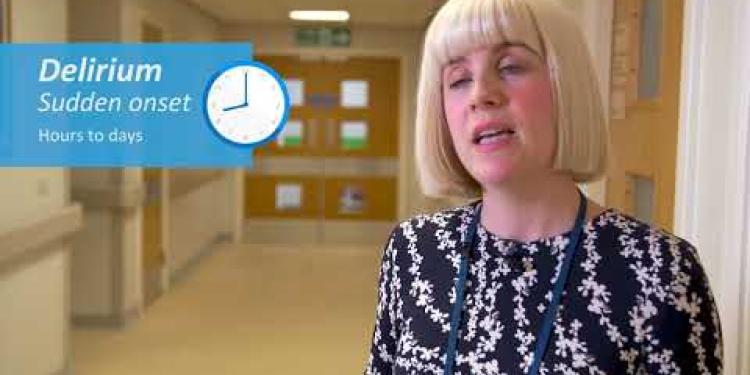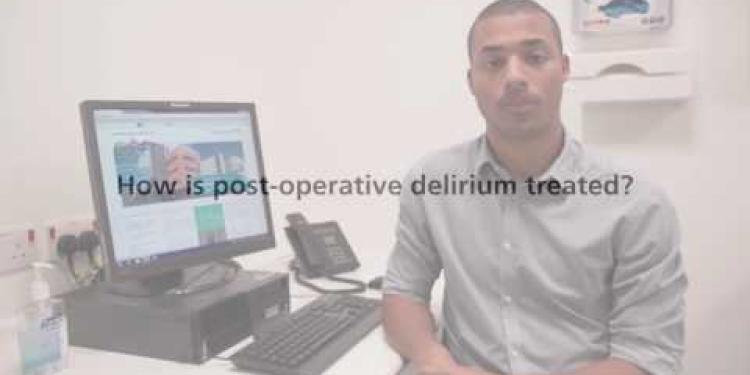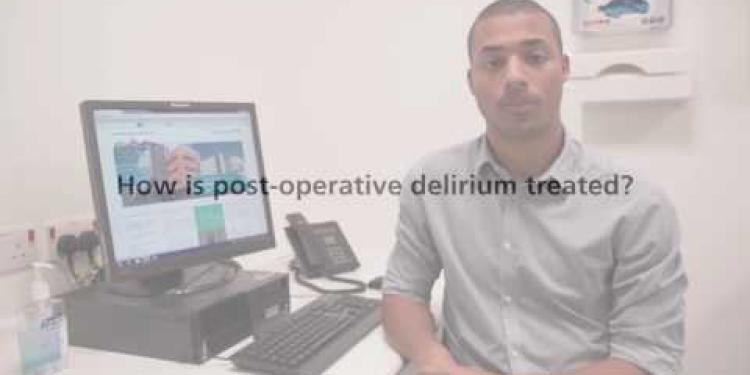Important Information On Using This Service
- Ergsy carefully checks the information in the videos we provide here.
- Videos shown by YouTube after a video has completed have NOT been reviewed by ERGSY.
- To view, click the arrow in the center of the video.
Using Subtitles and Closed Captions
- Most of the videos you find here will have subtitles and/or closed captions available.
- You may need to turn these on and choose your preferred language.
Turn Captions On or Off
- Go to the video you'd like to watch.
- If closed captions (CC) are available, settings will be visible on the bottom right of the video player.
- To turn on captions, click settings.
- To turn off captions, click settings again.
Find A Professional
More Items From Ergsy search
What is Delirium?
Understanding Delirium
Delirium is a serious disturbance in mental abilities that results in confused thinking and reduced awareness of the environment. Its onset is usually rapid, often within hours or a few days. Delirium can affect people of all ages but is more common in older adults and individuals who are hospitalized or residing in care facilities.
Causes of Delirium
The primary causes of delirium are diverse and can include severe or chronic illness, changes in metabolic balance (such as low sodium), medication side effects, infection, surgery, or alcohol or drug withdrawal. In the United Kingdom, delirium is particularly prevalent among older adults who are in hospitals or care homes.
Symptoms of Delirium
Symptoms of delirium typically include a sudden change in behavior, confusion, difficulty maintaining focus or attention, and disorientation. Other symptoms may involve hallucinations or experiencing rapid and unpredictable mood swings. Due to its rapid onset, delirium is often mistaken for dementia, but it is essential to note that delirium and dementia are distinct conditions.
Diagnosis and Treatment
Delirium can often be detected through a comprehensive medical and psychological evaluation. Healthcare professionals may employ several tools and tests to differentiate delirium from other types of cognitive impairments like dementia. Treatment usually focuses on addressing the underlying cause, whether it be managing an infection or adjusting medications. Ensuring a supportive environment, with adequate lighting and familiar objects, can also help in managing symptoms.
Importance of Awareness and Support
In the UK, awareness of delirium is growing, especially among healthcare providers and caregivers. Early recognition and intervention can significantly improve outcomes for individuals experiencing delirium. Supportive care and creating a comforting environment are crucial elements in managing delirium effectively. Furthermore, ongoing education for healthcare workers and caregivers is vital in ensuring the best care for individuals at risk.
Conclusion
Delirium is a critical condition that requires prompt attention and appropriate care, especially among vulnerable populations such as the elderly or those undergoing significant medical treatments. Awareness and understanding of delirium can lead to better prevention, earlier detection, and more effective management, thus improving the overall quality of care and outcomes for patients in the United Kingdom.
What is Delirium?
Understanding Delirium
Delirium is when a person gets suddenly confused. It affects how they think and feel. People might not know where they are or what is happening. It often starts quickly, like in a few hours or days. Delirium can happen to anyone but is more common in older people, especially if they are in the hospital or live in care homes.
Causes of Delirium
There can be many reasons for delirium. It can happen if someone is very sick or if their body balance changes, like having low salt levels. Medicines, infections, surgery, or not having enough alcohol or drugs when dependent can also cause delirium. In the UK, older people in hospitals or care homes often get delirium.
Symptoms of Delirium
When someone has delirium, they might suddenly start acting differently. They can be confused and struggle to focus. They might not know where they are. Some people see or hear things that are not there. Delirium starts quickly and can seem like dementia, but it is not the same.
Diagnosis and Treatment
To find out if someone has delirium, doctors do medical and mental check-ups. There are special tests to tell delirium apart from other memory problems. To help someone with delirium, doctors treat the cause, like an infection or changing medicines. Making sure the room is well-lit and has familiar objects can also help.
Importance of Awareness and Support
In the UK, more people are learning about delirium, especially doctors and caregivers. When delirium is spotted quickly, it helps the person get better faster. Having a calm and supportive place is important for managing delirium. Teaching doctors and caregivers about delirium is important so they can give the best help.
Conclusion
Delirium is serious and needs fast attention and care. It is important for older people or those having big medical treatments. Knowing about delirium helps prevent it, find it quickly, and manage it better. This helps people in the UK get better care.
Frequently Asked Questions
What is delirium?
Delirium is a serious disturbance in mental abilities that results in confused thinking and reduced awareness of the environment.
What are the common symptoms of delirium?
Common symptoms include sudden confusion, inability to stay focused, difficulty in understanding or speaking, and fluctuating levels of consciousness.
What causes delirium?
Delirium can be caused by various factors including infection, dehydration, medications, surgery, or severe illness.
Who is most at risk of developing delirium?
Elderly people, especially those with dementia, severe illness, or those undergoing major surgery, are at higher risk.
How is delirium diagnosed?
Doctors diagnose delirium based on a review of symptoms, medical history, and possibly a mental status examination.
Can delirium be treated?
Yes, identifying and treating the underlying cause of delirium can help. Supportive care and medications to manage symptoms may also be used.
Is delirium the same as dementia?
No. While both affect mental functioning, delirium usually has a sudden onset and is often reversible, whereas dementia develops slowly and is typically progressive and irreversible.
How long does delirium last?
Delirium can last from a few hours to several weeks or months, depending on the cause and overall health condition of the person.
Can delirium be prevented?
In some cases, delirium can be prevented by addressing risk factors such as dehydration, proper medication management, and maintaining a calm, supportive environment.
What should I do if a loved one shows signs of delirium?
Seek immediate medical attention as delirium can be a sign of a serious medical condition that needs prompt treatment.
Does delirium affect sleep?
Yes, people with delirium often experience sleep disturbances, including difficulty falling asleep, staying asleep, or experiencing fragmented sleep.
Can stress cause delirium?
While stress alone may not cause delirium, severe stress can exacerbate underlying health conditions or contribute to factors that cause delirium.
How can hospital staff help manage delirium in patients?
Hospital staff can help manage delirium by ensuring proper hydration, pain management, minimising the use of restrains, and promoting a calm hospital environment.
Is delirium a sign of a terminal condition?
Not necessarily. Delirium is often reversible if the underlying cause is treated, though it can be more common or severe in terminal conditions.
Is delirium common after surgery?
Yes, post-operative delirium is relatively common, especially in older adults or those with pre-existing cognitive impairments.
What is delirium?
Delirium is when a person gets confused very quickly. Their brain is not working right, so they might not know where they are or what is happening. This can be scary for the person and people around them.
If you want to help someone with delirium, you can talk to them calmly and let them know they are safe. Sometimes, it helps to have familiar things around, like a favorite blanket or photo.
You can ask a doctor or nurse for help, too. They can explain more and give advice.
Delirium is a sickness. It makes it hard to think and pay attention. People feel very confused.
What are the usual signs of delirium?
Delirium can make people feel very confused. Here are some usual signs:
- Not knowing where they are
- Seeing things that are not there
- Being very sleepy or finding it hard to stay awake
- Getting mixed up in what they are saying
- Feeling very worried or afraid
If you think someone has these signs, it is good to tell a doctor.
You can use tools like pictures or simple words to help explain.
Here are some signs to watch out for:
- You might feel confused all of a sudden.
- It can be hard to pay attention.
- You might have trouble understanding what people say or saying what you want to.
- Sometimes you feel awake, and other times you feel sleepy.
Try using pictures or simple words to help understand better. You can also ask someone to explain things to you if you need help.
What makes people confused and not think clearly?
Delirium is when the brain gets confused. It can happen because of things like getting sick with an infection, not drinking enough water (dehydration), taking some medicines, having an operation, or being very, very sick.
Who can get confused more easily?
Some people might get confused more easily. This is called delirium. Here are some people who might get confused:
- Older adults
- People who are very sick
- People who have problems with their memory
- People who have had surgery
If someone is confused, help them with these things:
- Make sure they are comfy and safe
- Talk to them in a calm voice
- Keep a light on so they know if it's day or night
- Ask a doctor or nurse for help
Older people can get more confused if they have memory problems (like dementia), are very sick, or are having big operations.
How do doctors find out if someone has delirium?
Doctors can tell if someone has delirium by looking at their symptoms. They also check their medical history and might do a simple test to see how their brain is working.
Can delirium be treated?
Yes, delirium can be treated. Delirium is when someone gets very confused or sees things that are not there. Doctors and nurses can help. Family and friends can be supportive too. They can talk calmly and make sure the confused person feels safe.
Here are some ways to help:
- Keep the room quiet and calm.
- Make sure the person gets enough sleep.
- Let the person know what time it is and where they are.
- Help them eat and drink enough.
- Always listen and talk to them slowly and clearly.
If you are worried about delirium, ask a doctor or nurse for help. They know what to do.
Yes, finding out what is causing the confusion can help fix it. Doctors may give medicine and extra care to help with the symptoms too.
Is delirium the same as dementia?
Delirium and dementia are not the same. They are different problems that affect the brain.
Delirium: It comes on quickly and makes a person confused. It can last for a few hours or days. It can be caused by an illness or an infection.
Dementia: It comes on slowly and affects memory and thinking for a long time. It can get worse over time and is usually not caused by an infection.
If you want more help understanding, you can talk to a doctor or a nurse. Words like "delirium" and "dementia" can be explained more simply.
No. Delirium and dementia both change how the mind works, but they are not the same. Delirium starts suddenly and can often be fixed. Dementia starts slowly and usually gets worse over time and cannot be fixed.
How long does delirium last?
Delirium is when someone gets very confused. It can be hard to focus and think clearly. Delirium does not last forever.
For some people, it can last a few hours or a day. For others, it can last a few weeks.
If someone is confused for a long time, it is important to tell a doctor.
To help someone with delirium:
- Keep things calm and quiet around them.
- Use simple words when you talk to them.
- Make sure they eat, drink, and rest.
Delirium can last a short time, like a few hours. Sometimes, it can last longer, like weeks or even months. How long it lasts can depend on what is causing it and how healthy the person is.
Can we stop delirium from happening?
Delirium is when a person gets very confused suddenly. We can try to stop it. Here are some ways to help:
- Make sure the person drinks enough water.
- Help them to stay calm and rested.
- Keep their surroundings quiet and comfortable.
- Remind them of where they are and what day it is.
If you are interested, tools like picture cards or calendars might be useful to help with understanding and remembering.
Sometimes, we can stop delirium from happening.
We can do this by:
- Making sure people drink enough water.
- Giving the right medicine in the right way.
- Keeping a calm and friendly place around them.
If you need help, talk to a doctor or nurse.
What to do if someone you love seems confused
If someone you love seems mixed up or very confused, it's important to get help.
Here are some steps you can take:
- Stay calm and talk gently to them.
- Call a doctor or nurse for advice.
- Make sure they are in a safe place.
Helpful Tip: You can write down what the doctor or nurse says. This will help you remember.
See a doctor right away. Delirium can mean something is very wrong with your health and needs fast treatment.
Does delirium affect sleep?
Delirium can make people confused and change how they think. It can also make sleeping hard. People with delirium might not sleep well at night. They may feel sleepy during the day.
If someone you know has delirium, help them by keeping the room quiet and dark at night. It is also good to keep a regular sleep schedule. You can use tools like a sleep mask or earplugs to help with sleeping.
Yes, people with delirium often have trouble with sleep. They might find it hard to fall asleep, stay asleep, or they might wake up a lot during the night.
Can stress make you confused?
Stress can sometimes make people feel very confused. This is called delirium.
If you feel confused when you are stressed, talk to a doctor or nurse. They can help you.
Using a calm voice and taking deep breaths can help you feel better.
Support tools like talking to someone you trust can also help.
Stress might not make delirium happen by itself, but a lot of stress can make other health problems worse or add to things that lead to delirium.
How can hospital staff help patients who feel confused?
Hospital workers can help patients who are confused by:
- Talking to them in a calm and kind way.
- Making sure the room is quiet and not too bright.
- Helping them feel comfortable and safe.
- Giving them things that remind them of home, like pictures or toys.
- Helping them know where they are and what time it is.
Supportive tools and techniques can include:
- Using simple words and short sentences to talk.
- Showing pictures to help explain things.
- Pointing to a clock or a calendar to help them understand time.
- Making sure they have things like glasses or hearing aids if they need them.
Hospital workers can help when someone is confused. They can do this by making sure the person drinks enough water, helping with any pain, not using tight straps, and keeping the hospital quiet and relaxing.
Does having delirium mean someone is very sick and near the end of life?
Delirium is a state where a person feels very confused and mixed up. It can happen when someone is really sick, but it does not always mean they are close to dying. If someone has delirium, it is important to talk to a doctor.
Here are some tools that might help:
- A family member or friend can help explain things.
- Pictures or simple words can make things clearer.
- Talking slowly and using short sentences can help a lot.
No, not always. Delirium can go away if doctors fix what is causing it. But, it might happen more often or be worse if someone is very sick.
Do people often get confused after surgery?
Yes, feeling confused after surgery is common. This happens a lot in older people or people who already have trouble thinking clearly.
Useful Links
Useful links from: How do you spot delirium
- NHS - Delirium This NHS page provides detailed information on delirium, including symptoms, causes, diagnosis, treatment, and when to seek medical advice.
- Age UK - What is Delirium? This Age UK page offers a comprehensive overview of delirium, including risk factors, symptoms, and tips for caregivers on how to manage and support someone with delirium.
- Alzheimer's Society - Delirium This Alzheimer's Society page explains the relationship between delirium and dementia, with advice on recognizing symptoms, preventative measures, and managing delirium in individuals with dementia.
- Mind - Understanding Delirium This Mind page provides an in-depth look at delirium, detailing causes, symptoms, treatments, and advice on what to do if you’re experiencing or caring for someone with delirium.
Useful links from: Delirium: A Patient Story at Leicester's Hospitals
- NHS: Delirium NHS guide on understanding delirium, including its symptoms, causes, and treatments.
- Leicester's Hospitals: Delirium Information from Leicester's Hospitals detailing what delirium is, as well as patient stories and care guidelines.
- Age UK: Understanding and Managing Delirium Age UK offers insights into the causes, symptoms, and management of delirium, especially in older people.
- Alzheimer's Society: Delirium The Alzheimer's Society provides information on how delirium is related to dementia, its impacts, and guidance for caregivers.
Useful links from: Experiencing delirium after surgery
- NHS - Delirium Comprehensive information on delirium, including symptoms, causes, diagnosis, treatment, and prevention, specifically from the NHS.
- Age UK - Delirium Age UK provides details on delirium, emphasizing how it affects older adults, and offers support and advice for patients and caregivers.
- Royal College of Psychiatrists - Delirium The Royal College of Psychiatrists' resource on delirium, containing in-depth information about symptoms, who is at risk, and management strategies.
- NHS Inform - Delirium after Surgery NHS Inform provides details about the causes, symptoms, and management of delirium specifically after surgical procedures.
Useful links from: What is delirium
- NHS - Delirium Comprehensive guide on delirium, including symptoms, causes, and treatments, provided by the National Health Service (NHS).
- Alzheimer's Society - Delirium Information about delirium from the Alzheimer's Society, including how it differs from dementia and tips for managing it.
- Age UK - Delirium Age UK's resource on delirium, discussing its impact on older adults, prevention strategies, and how to support someone with delirium.
- Mind - Delirium Mind's page on delirium, including its mental health implications, signs to watch for, and available support options.
Useful links from: The Delirium Question on Patientrack
- NHS - Delirium Overview This page provides an overview of delirium, including its causes, diagnosis, and treatment options.
- NHS Scotland - Delirium Toolkit NHS Scotland's Delirium Toolkit offers a comprehensive guide for healthcare professionals on managing and preventing delirium.
- Age UK - Delirium Support Age UK's resource on delirium provides information on understanding and managing the condition in older adults.
- Alzheimer's Society UK - Delirium and Dementia The Alzheimer's Society explains the link between delirium and dementia, and offers advice on addressing these conditions.
Have you found an error, or do you have a link or some information you would like to share? Please let us know using the form below.
- Ergsy carfully checks the information in the videos we provide here.
- Videos shown by Youtube after a video has completed, have NOT been reviewed by ERGSY.
- To view, click the arrow in centre of video.
- Most of the videos you find here will have subtitles and/or closed captions available.
- You may need to turn these on, and choose your preferred language.
- Go to the video you'd like to watch.
- If closed captions (CC) are available, settings will be visible on the bottom right of the video player.
- To turn on Captions, click settings .
- To turn off Captions, click settings again.












